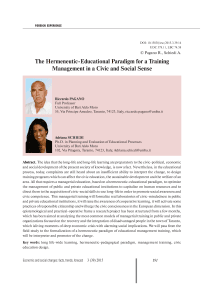The hermeneutic-educational paradigm for a training management in a civic and social sense
Автор: Pagano Riccardo, Schiedi Adriana
Журнал: Economic and Social Changes: Facts, Trends, Forecast @volnc-esc-en
Рубрика: Foreign experience
Статья в выпуске: 3 (39) т.8, 2015 года.
Бесплатный доступ
The idea that the long-life and long-life learning are preparatory to the civic-political, economic and social development of the present society of knowledge, is now a fact. Nevertheless, in the educational process, today, complaints are still heard about an insufficient ability to interpret the change, to design training programs which can affect the civic education, the sustainable development and the welfare of an area. All that requires a managerial education, based on a hermeneutic-educational paradigm, to optimize the management of public and private educational institutions to capitalize on human resources and to direct them to the acquisition of civic-social skills to use long-life in order to promote social awareness and civic competence. This managerial training will formalize real laboratories of civic-mindedness in public and private educational institutions, it will raise the awareness of cooperative learning, it will activate some practices of responsible citizenship and will urge the civic consciousness in the European dimension...
Long life-wide learning, hermeneutic-pedagogical paradigm, management training, civic education design
Короткий адрес: https://sciup.org/147223727
IDR: 147223727 | УДК: 378.11 | DOI: 10.15838/esc/2015.3.39.14
Список литературы The hermeneutic-educational paradigm for a training management in a civic and social sense
- Bisio C. Valutare in formazione, azioni, significati e valori. Milano: FrancoAngeli, 2002.
- Bobbio A., Scurati C. Ricerca pedagogica e innovazione educativa. Strutture, linguaggi, esperienze. Roma: Armando, 2008.
- Bonazzi G. Storia del pensiero organizzativo. Milano: FrancoAngeli, 2003.
- Bruscaglioni M. Leadership. Nuove prospettive e nuovi percorsi di sviluppo. Milano: FrancoAngeli, 2004.
- Buber M. Il principio dialogico. Milano: Ed. di Comunità, 1959.
- Carnegie D. Scopri il leader che è in te. Milano: Bompiani, 1996.
- Cremaschi L. Philokalia, the love of beauty Qiqajon. Magnano (Biella): Community of Bose, 2006.
- Crozier M. The Bureaucratic Phenomenon. Translated into Italian. Milano: Etats Kompas, 1969.
- Drucker P.F. The Power of Managers. Milano: Etats, 1967.
- Dutt C. Talking to Gadamer. Milano: Cortina, 1965.
- Fabbri l., Rossi B. Pratiche lavorative. Studi pedagogici per la formazione. Milano: Guerini, 2010.
- Ferraris M. Ermeneutica. Roma: Laterza, 1998.
- Gadamer H.G. Truth and Method. Edited by G. Vattimo. Milano: Bompiani, 1983.
- Gross E. Enterprise Organization. Milano: Giuffrè, 1979.
- Guitton J. The Book of Wisdom and Virtues Refound. Casale Monferrato (AL): Piemme, 1999.
- Heidegger M. Essere e tempo. Torino: Utet, 1927.
- Kaplan R.S., Norton D.P. The Balanced Scorecard: Measures that Drive Performance. Harvard Business Review, no. 70(1), 1992, pp. 71-79.
- Magris C. La storia non è finita. Etica, politica, laicità. Milano: Garzanti, 2006.
- Malavasi P. Pedagogia e formazione delle risorse umane. Milano: Vita e Pensiero, 2007.
- Marcus Aurelius Antoninus. Conversations to himself. Translated by Henry Turolla. Milano, 2003.
- Maslow A. Management. Roma: Armando, 2004.
- Nico P. Manager migliori, leader fortunati. Milano: FrancoAngeli, 2010.
- Nicoli D. Il lavoratore coinvolto. Professionalità e formazione nella società della conoscenza. Milano: Vita e Pensiero, 2009.
- Pagano R. La pedagogia generale. Aspetti, temi, questioni. Milano: Monduzzi editoriale, 2011.
- Palumbo M. Il processo di valutazione. Decidere, programmare, valutare. Milano: FrancoAngeli, 2002.
- Piccardo C. Insegnare e apprendere la leadership. Milano: Guerini e Associati, 1998.
- Quaglino G. Leadership. Nuovi profili di leader per nuovi scenari organizzativi. Milano: Raffaello Cortina, 2005.
- Quaglino G. Leadership. Nuovi profili di leader per nuovi scenari organizzativi. Milano: Raffaello Cortina, 2005.
- Rossi P., Freeman H.E. Evaluation. A Systematic Approach. Thousand Oaks, Ca: Sage, 1999.
- Sola G. Genealogia dell’humanitas. Pedagogia e vita, no. 2, 2006, pp. 110-129.
- Taylor F.W. The Principles of Scientific Management. Milano: edizioni di Comunità, 1952.
- Tizzi E. La Bellezza e la scienza. Il valore dell’estetica nella conoscenza scientifica. Milano: Cortina, 2001.
- Tscholl J. Dio e il bello in sant’Agostino. Milano: Ares, 1996.
- Voltaire. Treatise on Tolerance. Eedited by P. Togliatti, third edition. Rome: Editori Riuniti, 1973.
- Weber M. Economy and Society. Milano: Edizioni di Comunità, 1968.
- White F. Introduction to hermeneutics. Rome -Bari: Laterza, 1998.
- Wright C.R. Mass communication. Rome: Armando, 1965.


